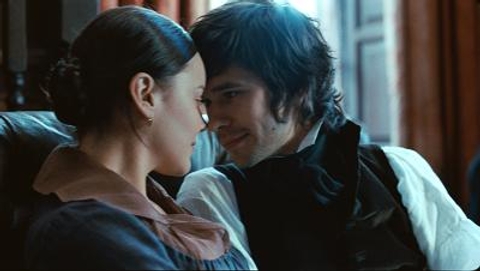Bright Star is the latest film from director Jane Campion and it explores the last years of John Keats (Ben Whishaw) and his relationship with Fanny Brawne (Abbie Cornish).
It is screening in competition and initial reviews seem to suggest it is a return to form for ther Kiwi director who hasn’t made a film since 2003’s In the Cut (now best remembered for Meg Ryan’s awkward interview on Parkinson).
Here is a summary of the initial critical reaction:
Todd McCarthy of Variety thinks it is an impressive return for Campion:
The Jane Campion embraced by 1990s arthouse audiences but who’s been missing of late makes an impressive return with “Bright Star.”
Breaking through any period piece mustiness with piercing insight into the emotions and behavior of her characters, the writer-director examines the final years in the short life of 19th century romantic poet John Keats through the eyes of his beloved, Fanny Brawne, played by Abbie Cornish in an outstanding performance.
Beautifully made film possesses solid appeal for specialized auds in most markets, including the U.S., where it will be released by Bob Berney’s and Bill Pohlad’s as-yet unnamed new distribution company, although its poetic orientation and dramatic restraint will likely stand in the way of wider acceptance.
Peter Bradshaw of The Guardian thinks Campion could be up for another Palme d’Or (she won in 1993 for The Piano):
Jane Campion has put herself in line for her second Palme d’Or here at the Cannes film festival with a film which I think could be the best of her career.
Campion brings to this story an unfashionable, unapologetic reverence for romance and romantic love, and she responds to Keats’s life and work with intelligence and grace.”
Allan Hunter of Screen International is impressed by
Sixteen years after The Piano, Jane Campion has found renewed artistic inspiration in a tragic romance to match the haunting intensity of that Palme D’Or winning feature.
Bright Star deftly avoids the stilted, starchy quality often found in lesser period dramas. Characters appear comfortable in their clothes and settings, the dialogue flows easily from their lips and there is a quiet, everyday intimacy to the way events unfold.
We are invited into this world rather than kept at arm’s length because nothing jars or seems out of place. The keen attention to detail is never obtrusive but instead creates a complete, credible universe.
Beautifully crafted in every department from the composure of the camerawork to the precision of the costume and production design, Bright Star is a film to savour.
Jeffrey Wells of Hollywood Elsewhere admires it with some reservations:
It’s been done quite perfectly — I was especially taken with Grieg Frasder‘s vermeer-lit photography — with immaculate fealty for the textures and tones of early 19th Century London, and a devotion to capturing the kind of love that is achingly conveyed in hand-written notes that are hand delivered by caring young fellows in waistcoats.
But it struck me nonetheless as too slow and restricted and…well, just too damnably refined. I looked at my watch three times and decided around the two-thirds mark that it should have run 100 rather than 120 minutes.
The pacing is just right for the time period — it would have felt appalling on some level if it had been shot and cut with haste for haste’s sake — but there’s no getting around the feeling that it’s a too-long sit. It’s basically a Masterpiece Theatre thing that my mother will love. I’m not putting it down on its own terms. I felt nothing but admiration for the various elements.
Dave Calhoun of Time Out thinks it has an admirable lightness of touch:
[it is] free of the hysterics so often associated with films about writers and deftly avoids the distracting surface tendencies that can plague British period pieces set in the 18th and 19th centuries.
“It’s also remarkable in its lightness of touch: the film barely tries to persuade us that Keats is a valid object of this girl’s affection or that he is a fine literary talent; we are left to learn both incidentally.
They’re wise choices, leaving Campion to concentrate on character and emotion rather than any special pleading about genius and its offshoots.”
Ray Bennett in The Hollywood Reporter predicts an arthouse hit:
With much grace and at considerable leisure, 1993 Palme d’Or winner Campion (“The Piano”) tells the story of the brief love affair between the gifted but early dead poet John Keats and Fanny Brawne.
Ben Whishaw plays Keats with impeccable tragedy and Abbie Cornish portrays winningly the beautiful seamstress Fanny, whose passion is constrained only by the rigorous mores of the times.
Cynics need not apply and it’s doubtful that “Bright Star” will be the shining light at many suburban cineplexes, but festivals will eat it up, art house audiences will swoon and it will have a lucrative life on DVD and Blu-ray, not to mention the BBC and PBS.
Here is a clip of the film from AFP:
Check the official Cannes site which has audio and video from the press conference.
More photos of the film can be seen here at Filmofilia.
> Bright Star at the IMDb
> Jane Campion at Wikipedia
